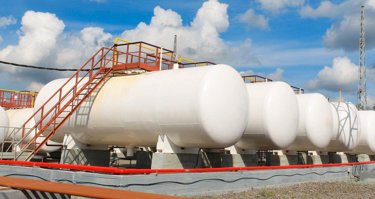The fundamentals of taking care of your storage tanks
Published: 4 April 2023
Storage tanks are a vital part of operational infrastructure for many organisations, so it is essential these assets are cared for and regularly maintained.
Knowing the fundamentals of good storage tank management and putting a proper inspection and maintenance regime in place will ensure storage tanks are in good condition and do not pose a risk to the environment or human health. It also helps prevent leaks and spills, which can could cause environmental damage and require costly clean-up action.
Storage tank inspection
Regular inspection of storage tanks is necessary to check whether they are safe and in good condition.
Inspections should be conducted by qualified personnel who are trained in tank inspection and are knowledgeable about the type of tank being inspected. They should have appropriate equipment and be aware of relevant guidance, such as EEMUA 159 and API 653.
Here are some of the key things that should be checked during a fuel storage tank inspection.
- Visual: A visual inspection should check for cracks, corrosion, and other signs of damage to the tank's surface.
- Lining: The tank lining should be checked for any signs of wear or damage. If the tank lining is damaged, it can lead to corrosion of the tank.
- Foundations: The tank foundations should be checked for any signs of settling or shifting. This alteration to the centre of the gravity can cause stress on certain parts of the tank, which can lead to leaks and other issues.
- Connections: The connections between the tank and the piping should be checked for leaks or damage.
- Leak detection equipment: The leak detection equipment should be checked to ensure it is working correctly.
- Fill level: The tank level should be checked to ensure it is not overfilled, which can cause spills and leaks.

Storage tank maintenance
Proactive maintenance helps ensure asset longevity and prevent costly repairs.
Planned preventive maintenance should be conducted on a regular basis, and this should be performed by qualified personnel who are trained and experienced in tank maintenance.
When maintaining a storage tank, here are the key areas to consider.
- Cleaning: The tank should be cleaned regularly to remove any sediment or sludge that may have accumulated at the bottom. This can help prevent corrosion and extend the life of the tank.
- Painting: The tank should be painted to protect it from the elements and prevent rust.
- Venting: The tank should be vented to prevent the build-up of pressure inside the tank. This can prevent leaks and other issues.
- Insulation: The tank should be insulated to prevent heat loss and prevent condensation from forming inside the tank.
- Fuel quality testing: The quality of any fuel in the tank should be tested regularly to ensure it meets the required standards.
- Inspection: Regular inspections should be conducted to identify any potential issues before they become major problems.
- Monitoring: A tank monitoring system should be installed to detect any leaks or other issues that may arise.
Storage tank failure
Storage tanks do fail. Sometimes this is due to unforeseen events, but often it is down to poor inspection and irregular maintenance.
These failures have significant consequences for asset managers in the form of heavy fines from the Environment Agency, loss of revenue caused by equipment downtime, and substantial costs for the clean-up and remediation of a spill.
Given the contents of most storage tanks, a tank failure can result in environmental damage, fires, explosions, and even loss of life.
There are many potential causes of storage tank failure, including corrosion, poor maintenance, and overfilling. Tanks can also become weakened due to exposure to the elements and may develop leaks or cracks.
A regime of inspection and maintenance will minimise the risk of a storage tank failure. This can include checking for signs of corrosion, ensuring proper ventilation, and monitoring the tank for leaks. Tanks should also be equipped with proper safety features, such as overfill prevention devices and emergency shut-off valves.
Should a storage tank failure occur, it is critical to respond quickly and effectively to mitigate the damage. This may involve containing the spill, evacuating nearby areas, and conducting a thorough clean-up. It is also important to investigate the cause of the failure and take steps to prevent similar incidents in the future.
Take care of your storage tanks proactively
Planned preventive maintenance (PPM) is a proactive approach that involves scheduled inspections and maintenance of your storage tanks to prevent disastrous failures.
Adopting a PPM strategy has many benefits for businesses, such as extending the lifespan of equipment, reducing repair costs, improving operational efficiency, and preserving workplace safety.
Extending the lifespan of equipment
By regularly inspecting and maintaining equipment, organisations can identify potential issues and address them before they become major problems. This can reduce the need for repairs or replacements and ensure that equipment lasts longer, ultimately saving money in the long run.
Reducing repair costs
By identifying and addressing issues early on, businesses can avoid more costly repairs later down the line. This helps keep maintenance costs predictable and lower the likelihood of unplanned operational downtime.
Improving operational efficiency
By performing regular maintenance tasks, organisations can ensure that equipment is operating efficiently and effectively. This can help to improve productivity and reduce the risk of unplanned downtime, which can have a significant impact on operations.
Preserving workplace safety
By regularly inspecting and maintaining equipment, organisations can also identify potential safety hazards and address them before they become a risk to employees. This helps preserve a safe work environment and lessen the risk of workplace accidents and injuries.
Adopting a planned preventive maintenance approach is a plays a key role in any effective maintenance program. By investing in PPM, organisations can ensure they are maximising the return on their maintenance investment.
If you have storage tanks on your estate, they should be inspected and maintained regularly to ensure their safety and prevent potential issues. Right now, the focus on your storage tanks and wider energy infrastructure has never been more important.
More from our Knowledge Hub
 News
NewsAdler & Allan shortlisted for three British Diversity Awards
 Insights
InsightsEnsuring seasonal resilience for your sites – what to prioritise now
 White paper
White paperSolution to pollution: A holistic catchment-wide strategy for the water industry
 Insights
InsightsThe challenge and opportunity for the UK's electricity network
Environmental compliance today, creating a sustainable tomorrow
Helping you reduce risk to the environment and your operation by managing assets compliantly while achieving commercial, ESG, and net-zero goals.
Contact our experts
